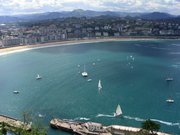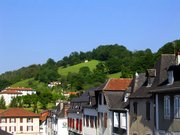Basque Country
|
|
This article is about the traditional Basque domain. For the Spanish autonomous community, see Basque Country (autonomous community).
Basque_Country_location_map.png
Location of Basque Country
The Basque Country (Euskal Herria in Basque) straddles the western Pyrenees mountains that define the border between France and Spain, extending down to the coast of the Bay of Biscay. It corresponds more or less with the historical area of the Basque people and language.
| Contents [hide] |
Geography
The Basque Country is made up of seven traditional regions. The four regions to the south, within Spain, form Hegoalde (“south zone”), while the three to the northeast, within France, form Iparralde (“north zone”).

Southern Basque Country
- Álava (Araba in Basque)
- Guipúzcoa (Gipuzkoa in Basque)
- Navarre (Nafarroa in Basque, Navarra in Spanish)
- Biscay (Bizkaia in Basque, Vizcaya in Spanish)
Northern Basque Country
- Lower Navarre (Behe Nafarroa in Basque, Basse-Navarre in French)
- Labourd (Lapurdi in Basque)
- Soule (Zuberoa in Basque)
Today's borders
Today, the Southern Basque Country falls within the Spanish autonomous communities of the Basque Country and Navarra-Navarre-Nafarroa, and the Northern Basque country forms part of the French département of Pyrénées Atlantiques.
History
See the article on the Basque people for their full history.
The Kingdom of Navarre was the only political entity to encompass the Basque Country on both sides of the Pyrenees. The kingdom reached its greatest size under Sancho III of Navarre (c. 985–1035). It incorporated most Basque-speaking lands, among others, but was divided repeatedly after his death. In 1511, the Southern part was incorporated into the Spanish crown, but Basse-Navarre, north of the Pyrenees remained independent to be later incorporated into the French crown, and ceased to have a unifying significance.
Since the time of Sancho III, there has been no single government over all seven territories. Basque nationalism emerged in the early 20th century as the aspiration for such a nation state. In the 1980s, the Spanish state devolved into autonomous communities, of which the Spanish Basque Country became the Basque Country. Against the wishes of Basque nationalists, Navarre established itself separately with little cultural collaboration. More recently, cross-border meetings among the Basque regions have been sponsored by the Atlantic Arc Commission of the European Union.
See also
- Basque Country (autonomous community)
- Basque people
- Basque Mythology
- List of not fully sovereign nations
Template:Euskal Herria provinces
ca:Euskal Herria da:Baskerlandet de:Baskenland eo:Eŭskio es:Euskal Herria et:Baskimaa eu:Euskal Herria fr:Pays basque hu:Baszkföld it:Nazione Basca ja:バスク国 jbo:auskalerik no:Baskerland oc:País Basc pl:Kraj Basków simple:Basque Country

